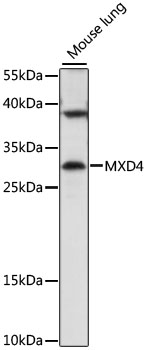Epigenetics & Nuclear Signaling Antibodies 2
Anti-MXD4 Antibody (CAB16485)
- SKU:
- CAB16485
- Product Type:
- Antibody
- Reactivity:
- Mouse
- Host Species:
- Rabbit
- Isotype:
- IgG
- Antibody Type:
- Polyclonal Antibody
- Research Area:
- Epigenetics and Nuclear Signaling
Description
| Antibody Name: | Anti-MXD4 Antibody |
| Antibody SKU: | CAB16485 |
| Antibody Size: | 20uL, 50uL, 100uL |
| Application: | WB |
| Reactivity: | Mouse |
| Host Species: | Rabbit |
| Immunogen: | Recombinant fusion protein containing a sequence corresponding to amino acids 110-209 of human MXD4 (NP_006445.1). |
| Application: | WB |
| Recommended Dilution: | WB 1:500 - 1:2000 |
| Reactivity: | Mouse |
| Positive Samples: | Mouse lung |
| Immunogen: | Recombinant fusion protein containing a sequence corresponding to amino acids 110-209 of human MXD4 (NP_006445.1). |
| Purification Method: | Affinity purification |
| Storage Buffer: | Store at -20'C. Avoid freeze / thaw cycles. Buffer: PBS with 0.02% sodium azide, 50% glycerol, pH7.3. |
| Isotype: | IgG |
| Sequence: | RRAL SIKE QLQQ EHRF LKRR LEQL SVQS VERV RTDS TGSA VSTD DSEQ EVDI EGME FGPG ELDS VGSS SDAD DHYS LQSG TGGD SGFG PHCR RLGR PALS |
| Gene ID: | 10608 |
| Uniprot: | Q14582 |
| Cellular Location: | Nucleus |
| Calculated MW: | 23kDa |
| Observed MW: | 30kDa |
| Synonyms: | MXD4, MAD4, MST149, MSTP149, bHLHc12 |
| Background: | This gene is a member of the MAD gene family . The MAD genes encode basic helix-loop-helix-leucine zipper proteins that heterodimerize with MAX protein, forming a transcriptional repression complex. The MAD proteins compete for MAX binding with MYC, which heterodimerizes with MAX forming a transcriptional activation complex. Studies in rodents suggest that the MAD genes are tumor suppressors and contribute to the regulation of cell growth in differentiating tissues. |
| UniProt Protein Function: | Mad4: Transcriptional repressor. Binds with MAX to form a sequence-specific DNA-binding protein complex which recognizes the core sequence 5'-CAC[GA]TG-3'. Antagonizes MYC transcriptional activity by competing for MAX and suppresses MYC dependent cell transformation. |
| UniProt Protein Details: | Chromosomal Location of Human Ortholog: 4p16.3 Cellular Component: nucleus Molecular Function:DNA binding; protein binding; protein dimerization activity; transcription corepressor activity Biological Process: negative regulation of cell proliferation; negative regulation of transcription from RNA polymerase II promoter; transcription, DNA-dependent |
| NCBI Summary: | This gene is a member of the MAD gene family . The MAD genes encode basic helix-loop-helix-leucine zipper proteins that heterodimerize with MAX protein, forming a transcriptional repression complex. The MAD proteins compete for MAX binding with MYC, which heterodimerizes with MAX forming a transcriptional activation complex. Studies in rodents suggest that the MAD genes are tumor suppressors and contribute to the regulation of cell growth in differentiating tissues. [provided by RefSeq, Jul 2008] |
| UniProt Code: | Q14582 |
| NCBI GenInfo Identifier: | 5453734 |
| NCBI Gene ID: | 10608 |
| NCBI Accession: | NP_006445.1 |
| UniProt Secondary Accession: | Q14582,Q5TZX4, A2A335, |
| UniProt Related Accession: | Q14582 |
| Molecular Weight: | 23,528 Da |
| NCBI Full Name: | max dimerization protein 4 |
| NCBI Synonym Full Names: | MAX dimerization protein 4 |
| NCBI Official Symbol: | MXD4 |
| NCBI Official Synonym Symbols: | MAD4; MST149; MSTP149; bHLHc12 |
| NCBI Protein Information: | max dimerization protein 4 |
| UniProt Protein Name: | Max dimerization protein 4 |
| UniProt Synonym Protein Names: | Class C basic helix-loop-helix protein 12; bHLHc12; Max-associated protein 4; Max-interacting transcriptional repressor MAD4 |
| Protein Family: | Max dimerization protein |
| UniProt Gene Name: | MXD4 |
| UniProt Entry Name: | MAD4_HUMAN |
View AllClose







